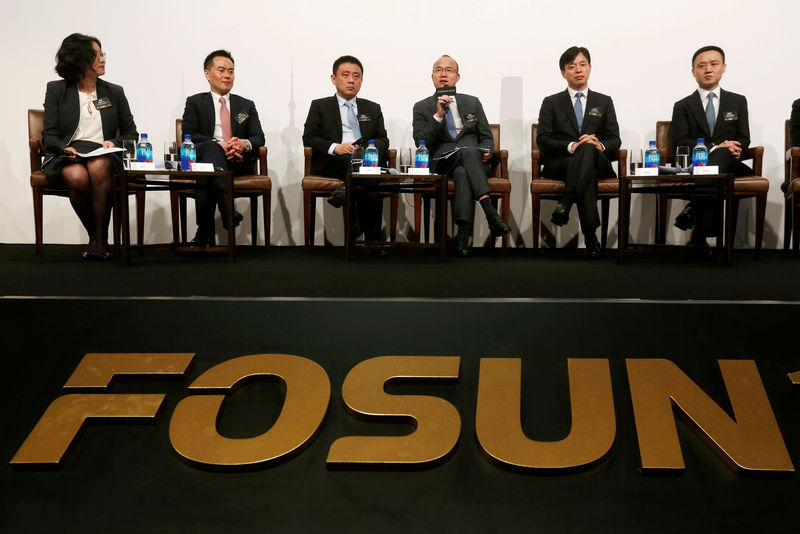By Julie Zhu
HONG KONG (Reuters) - Chinese conglomerates, still eager to snap up assets abroad, are rushing to raise money offshore in order to get around capital outflow curbs that have made it much tougher for Chinese bidders to complete outbound mergers and acquisitions.
Acquisitive Chinese conglomerates - including Fosun International (HK:0656), WH Group (HK:0288) and China Everbright - that can use offshore assets to raise capital outside China say the curbs are working to their advantage by deterring potential rival bids from more domestically-focused Chinese companies that have fewer options for raising funds overseas.
"Some Chinese companies have missed out on overseas opportunities due to lengthy regulatory processes at home, but if you can raise U.S. dollars and invest in dollars too, you would not be shackled by regulatory and forex issues," said Chen Shuang, CEO of China Everbright Limited (HK:0165), the Hong Kong investment arm of state-owned China Everbright Group.
Chinese bidders spent a record $105 billion on assets ranging from movie studios to football clubs in 2016 but over the past six months Beijing – in a bid to prop up the flagging yuan – has cracked down on companies taking money offshore to buy non-core assets.
This hasn't stopped China's conglomerates, who remain hungry for overseas purchases.
They have been leveraging a range of overseas assets, including listed subsidiaries, privately-held affiliates and insurance cash, to raise capital from equity and bond issuance, as well as loans offshore, bankers and executives at these groups said.
Chinese companies issued 93 offshore bonds worth about $60 billion from December 1st to March 2017, three times the amount raised over the same year-ago period, according to Thomson Reuters data - largely to fund deals, say bankers.
Fosun has been among the most active companies, raising $1.4 billion in offshore bonds since March via its British Virgin Islands entity Fortune Star Ltd.
The conglomerate has said Beijing's capital controls are a challenge, but it continues to have several means of financing overseas transactions.
"We definitely have to make good use of our Hong Kong-listed platforms which could offer us a number of means for fundraising, including bonds and syndicated loans," Chen Qiyu, co-president of Fosun said in an interview, referring to the fact the group has several Hong Kong-listed subsidiaries.
LATE TO THE PARTY
Likewise, Chinese tech behemoth Tencent last month inked a $4.65 billion offshore loan in order to finance more deals,, while other Chinese companies such as WH Group can draw on dollar revenues generated by overseas subsidiaries.
Wan Long,chairman of WH Group, said capital restrictions were not a concern for him as nearly 60 percent of the group's revenues are derived from the United States following its $4.7 billion takeover of Smithfield Food Inc [SFII.UL] in 2013.
"As a global company, we are not worried. We have revenues in foreign currencies which can flow freely. But for Chinese firms which have just started to go global, it will be difficult for them."
Bankers said they had grown reluctant to deal with Chinese purchasers that do not have overseas capital.
When Tencent formed a consortium to snap up European game developer Supercell for $8.6 billion last October, it chose several Chinese investors with ample cash overseas. They included China CITIC Bank Corp (SS:601998) and bad debt manager China Cinda Asset Management (HK:1359).
One person involved in the consortium said Tencent did not even consider bringing onboard Chinese investors that did not have offshore funds to hand because the deal had to move fast.
Tencent didn't respond to a Reuters request for comment.
According to Sam Sun, greater China head of AGIC Capital, an Asian-European private equity firm, capital curbs could also benefit Chinese buyers with offshore money by lowering prices for assets due to less competition from domestic rivals.
“Last year we saw a lot of Chinese funds and buyers going overseas and there was a concern in the market because it would inflate the price artificially,” he said. “Capital controls have made people think more rationally what they really want to acquire. That did reduce competition in a good way."
But some bankers privately warned of rising risks for increasingly-leveraged Chinese conglomerates that continue to use new assets to raise yet more finance in order to carry on their overseas shopping spree.
“It's a big risk," said one banker of such types of deals. "If any of its (the buyers') leveraged overseas units become shaky due to whatever reasons then it would set off a chain reaction. The financial strength of the underlying overseas assets is very critical."
Aviation-to-property group HNA Group [HNAIRC.UL] which has been aggressively snapping up global assets, for example has pledged newly-acquired entities as collateral to help fund the next purchase, according to people who have advised on its overseas deals.
Late last year, its Irish subsidiary Avolon, which it acquired in 2015, raised a $8.5 billion loan mainly from Morgan Stanley (NYSE:MS) and UBS, to help back its $10 billion takeover of the aircraft-leasing business of New York-based CIT Group, Thomson Reuters publication IFR reported.
A spokeswoman for HNA declined to comment.
